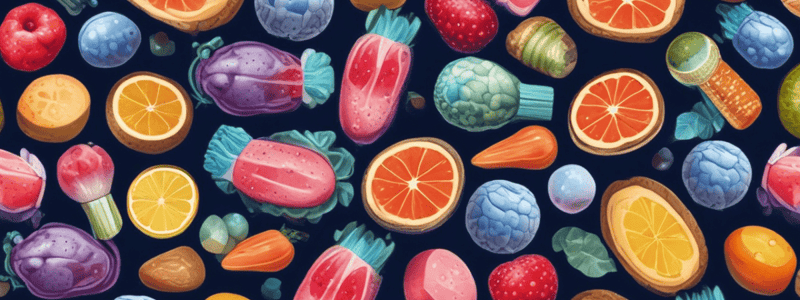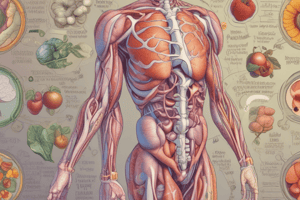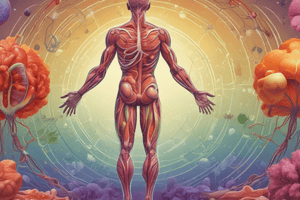Podcast
Questions and Answers
Water is the most essential nutrient of the human body.
Water is the most essential nutrient of the human body.
True (A)
Sodium is mainly found in intracellular fluid.
Sodium is mainly found in intracellular fluid.
False (B)
Chloride and phosphate are the main ions balanced inside and outside cells.
Chloride and phosphate are the main ions balanced inside and outside cells.
False (B)
Osmosis allows movement for equalization of electrolytes.
Osmosis allows movement for equalization of electrolytes.
Men have higher daily water intake recommendations compared to women.
Men have higher daily water intake recommendations compared to women.
Lactating women have increased water needs compared to pregnant women.
Lactating women have increased water needs compared to pregnant women.
Water is not considered an essential ingredient for life.
Water is not considered an essential ingredient for life.
The chapter covers the intake recommendations for minerals but not for water.
The chapter covers the intake recommendations for minerals but not for water.
Chloride is not discussed as a major mineral in the chapter.
Chloride is not discussed as a major mineral in the chapter.
Minerals do not play a role in the absorption, storage, and transport within the body.
Minerals do not play a role in the absorption, storage, and transport within the body.
Deficiency or toxicity of minerals does not lead to symptoms and diseases.
Deficiency or toxicity of minerals does not lead to symptoms and diseases.
Mineral supplementation has no associated risks or benefits.
Mineral supplementation has no associated risks or benefits.
Major minerals are destroyed by heat, light, acidity, or alkalinity.
Major minerals are destroyed by heat, light, acidity, or alkalinity.
Humans need less than 100 mg per day of major minerals.
Humans need less than 100 mg per day of major minerals.
Drinking excessive amounts of water can lead to water intoxication.
Drinking excessive amounts of water can lead to water intoxication.
It is safe for newborn babies to drink water.
It is safe for newborn babies to drink water.
Swallowing pool water can lead to dry drowning.
Swallowing pool water can lead to dry drowning.
Water reabsorption in GI tract secretions occurs mostly in the small intestines.
Water reabsorption in GI tract secretions occurs mostly in the small intestines.
Dehydration can cause early signs like fatigue, headache, and light-colored urine.
Dehydration can cause early signs like fatigue, headache, and light-colored urine.
A water loss of 20% can lead to coma and death.
A water loss of 20% can lead to coma and death.
Seniors and infants are less vulnerable to dehydration compared to adults.
Seniors and infants are less vulnerable to dehydration compared to adults.
Chronic dehydration can lead to constipation, hypertension, and coronary heart disease.
Chronic dehydration can lead to constipation, hypertension, and coronary heart disease.
Water intoxication can result from consuming excessive amounts of fluids that exceed the kidneys' maximal excretion rate.
Water intoxication can result from consuming excessive amounts of fluids that exceed the kidneys' maximal excretion rate.
Water excretion is due to continuous evaporation of water from the lungs and skin.
Water excretion is due to continuous evaporation of water from the lungs and skin.
ADH stands for Alcohol Dependent Hormone.
ADH stands for Alcohol Dependent Hormone.
Nicotine stimulates the release of ADH.
Nicotine stimulates the release of ADH.
Aldosterone is part of the Renin-Angiotensin System.
Aldosterone is part of the Renin-Angiotensin System.
Angiotensin II levels increase in response to reduced blood volume and pressure.
Angiotensin II levels increase in response to reduced blood volume and pressure.
Thirst is triggered by decreased osmolarity of fluid surrounding osmoreceptors.
Thirst is triggered by decreased osmolarity of fluid surrounding osmoreceptors.
Flashcards are hidden until you start studying
Study Notes
Water: The Essential Ingredient for Life
- Water makes up approximately 60% of body weight and contains numerous dissolved electrolytes.
- Electrolytes are balanced inside and outside cells, with:
- Sodium mainly found in extracellular fluid
- Potassium mainly found in intracellular fluid
- Chloride and phosphate also present
- Osmosis allows for the movement of electrolytes to achieve equalization.
Intake Recommendations
- Men: 3.7 liters/day (AI)
- Women: 2.7 liters/day (AI)
- Pregnancy: 3 liters/day (AI)
- Lactation: 3.8 liters/day (AI)
- Increased needs for athletes and individuals with high energy expenditure
Minerals
- Major minerals: inorganic elemental atoms or ions that cannot be destroyed by heat, light, acidity, or alkalinity
- Quantity needs: >100 mg per day
Sodium
- Major symptoms and diseases associated with sodium deficiency: muscle cramps, weakness, and heart palpitations
- Major symptoms and diseases associated with sodium toxicity: hypertension, heart disease, and stroke
Potassium
- Major symptoms and diseases associated with potassium deficiency: muscle weakness, fatigue, and heart palpitations
- Major symptoms and diseases associated with potassium toxicity: cardiac arrhythmias and muscle weakness
Calcium
- Major symptoms and diseases associated with calcium deficiency: osteoporosis, osteopenia, and rickets
- Major symptoms and diseases associated with calcium toxicity: kidney stones, calcification of soft tissues, and constipation
Phosphorus
- Major symptoms and diseases associated with phosphorus deficiency: muscle weakness, bone pain, and osteomalacia
- Major symptoms and diseases associated with phosphorus toxicity: kidney damage, bone damage, and diarrhea
Magnesium
- Major symptoms and diseases associated with magnesium deficiency: muscle cramps, weakness, and heart palpitations
- Major symptoms and diseases associated with magnesium toxicity: diarrhea, nausea, and muscle weakness
Sulfur
- Major symptoms and diseases associated with sulfur deficiency: skin problems, hair loss, and brittle nails
- Major symptoms and diseases associated with sulfur toxicity: diarrhea, nausea, and allergic reactions
Dehydration
- Early signs: fatigue, headache, dark urine with strong odor
- Water loss of 20% can cause coma and death
- Seniors and infants are especially vulnerable
- Water consumption is the primary treatment
Chronic Dehydration
- Constipation
- Hypertension
- Coronary heart disease
- Glaucoma
- Diabetes complications
Water Intoxication (Overhydration)
- Replacement of fluid losses with plain water (no electrolytes) can lead to water toxicity
- Rapid consumption of large quantities of fluids can exceed kidneys' maximal excretion rate (0.7 to 1.0 liters/hour)
- Disorders: untreated glandular disorders, mental disorders, compulsive water intake, and excessive retention
- Symptoms: headaches, confusion, difficulty breathing, seizures, and death
Water Excretion
- Continuous evaporation of water from lungs and skin
- Urine excretion is regulated by antidiuretic hormone (ADH)
- Sensors in kidneys detect changes in blood volume and pressure
- Response to dietary sodium: renin-angiotensin-aldosterone system (RAS)
Blood Volume and Pressure Regulation
- Sensors in kidneys detect changes in blood volume and pressure
- Enzymes: renin, angiotensin I, angiotensin II, angiotensinogen, and aldosterone
- Response to dietary sodium: renin-angiotensin-aldosterone system (RAS)
Water Balance - Thirst
- Four major stimuli:
- Increased osmolarity of fluid surrounding osmoreceptors in the hypothalamus
- Reduced blood volume and pressure
- Increased angiotensin II
- Dryness of mouth and mucous membranes lining the esophagus
Studying That Suits You
Use AI to generate personalized quizzes and flashcards to suit your learning preferences.



